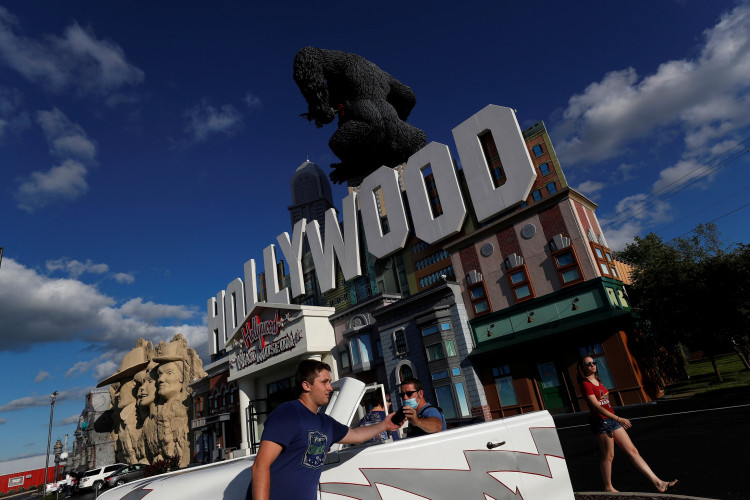After nearly five months, the major Hollywood writers' strike is poised to come to a close. According to a report from Variety on the evening of September 24, Hollywood writers have reached a preliminary agreement with production companies and streaming services. The three parties have signed a three-year contract, committing to end the strike that has caused significant losses to the Hollywood film and television industry.
The Writers Guild of America (WGA) conveyed to its members that the agreement is exceptionally significant, securing meaningful benefits and protections for its members. However, the details of the agreement are yet to be finalized. The guild emphasized that no one should return to work unless explicitly authorized by the association, and until then, the strike continues.
Reports suggest that while the strike remains in effect according to the WGA's contract and procedures, picketing activities at major studios were halted on Sunday evening. It's anticipated that the guild's leadership will vote on Tuesday to decide whether to formally lift the strike order. The basic procedure involves the WGA's East and West councils voting separately to approve the new agreement, after which the contract will be presented to the guild's 11,000 members for ratification. Specific details of the agreement will be disclosed at that time.
The Hollywood writers' strike began on May 2 of this year, with actors joining the cause on July 13, lasting a total of 146 days. The central stakeholders in this strike include the WGA, the Screen Actors Guild (SAG), and the Alliance of Motion Picture and Television Producers (AMPTPT). The strike originated from disagreements between the WGA and AMPTPT over revenue distribution, later expanding to issues like pay equity, post-production bonuses, and the regulation of AI usage, marking a significant labor dispute in the U.S. film and television industry.
Writers and actors argue that the current "Minimum Basic Agreement" has significantly reduced writers' incomes compared to a decade ago. They believe that production companies and streaming platforms should substantially increase revenue distribution for rerun episodes, paying royalties based on the popularity of the work. However, producers rejected this demand, stating that the success of a program should be determined by third-party company statistics, and many streaming platforms have yet to turn a profit.
The "mini's room" system, widely used by streaming platforms, became a key point of contention between the WGA and AMPTPT. Typically, a mini's room consists of 2 to 3 writers responsible for drafting 2 to 3 versions of the first three episodes of a series, which are then presented to streaming platforms for selection. Once approved, these writers cannot participate in subsequent creation, similar to pilot episodes used to gauge a show's potential.
This system effectively changes the traditional TV-era writers' ecosystem. On one hand, writers in mini's rooms can't advance in their careers and are relegated to auxiliary roles. On the other hand, their income takes away from the budget allocated to full-time writers, reducing earnings for both groups, while platforms benefit by reducing costs and risks.
Another issue is that streaming series typically have shorter seasons, usually 8 to 10 episodes, compared to traditional TV series that often exceed 15 episodes per season. Additionally, streaming platforms' viewership data is opaque, making it harder to ensure writers' rights.
To address these challenges, the WGA demands the abolition of the mini's room system and mandates that regular writers' rooms have no fewer than six members. Regarding income, the WGA's proposal aims to bring an annual revenue of $429 million for all writers and authors, while AMPTPT offers a budget of only $86 million, a significant disparity.
AMPTPT initially refused to negotiate with the WGA. According to a Deadline report on July 11, AMPTPT member company executives stated that negotiations with the WGA wouldn't commence until October at the earliest. One anonymous executive mentioned, "The end game is to drag this out until WGA members start losing their apartments and homes."
Differing views on generative AI, such as ChatGPT, were another core issue. Writers oppose the use of AI to replace human writers, especially using writers' works to train AI and using AI-generated content as original material. Actors demand that producers not use their likeness or voice in films without compensation. Fran Drescher, president of SAG-AFTRA, stated that if they don't stand up now, they risk being replaced by machines.
Disney CEO Bob Iger warned that the strike would have a "very destructive impact on the entire industry." He mentioned in a CNBC interview that the world is going through tough times, and the strike exacerbates the chaos.
Due to union regulations, actors couldn't participate in any film shooting or promotional activities during the strike, bringing Hollywood close to a standstill. As a result, productions like the final season of "Stranger Things," the second season of "The Last of Us," "Desperate Writers" season three, "Elementary School Drama" season three, and movies like "Dune 2" and the new "Blade" were all affected.
After a round of negotiations on August 10, AMPTPT chose to compromise, agreeing to measures to protect writers from the impact of AI technology. However, both parties still couldn't agree on the WGA's demand for streaming platforms to pay royalties based on a work's popularity.
On August 30, California State Treasurer Fiona Ma wrote to Netflix, Disney, Comcast, Warner Bros., and other production companies, urging them to return to negotiations and resolve the strike. Ma stated that the strike has paralyzed Hollywood, affecting the entire state of California, with countless businesses, thousands of pension beneficiaries, and millions of Californians suffering. The state could face billions of dollars in economic output losses. It's estimated that the 2007-2008 shutdown between studios and writers caused the state over $2 billion in losses.
Meanwhile, several production companies faced losses due to the halt in operations. Warner Bros. reported a revenue loss of $500 million for 2023 due to the strike. Amid the strike and internal shareholders suing the former CEO over streaming business complications, Disney's stock price approached a multi-year low, standing at only $81.25 per share at the time of reporting.






